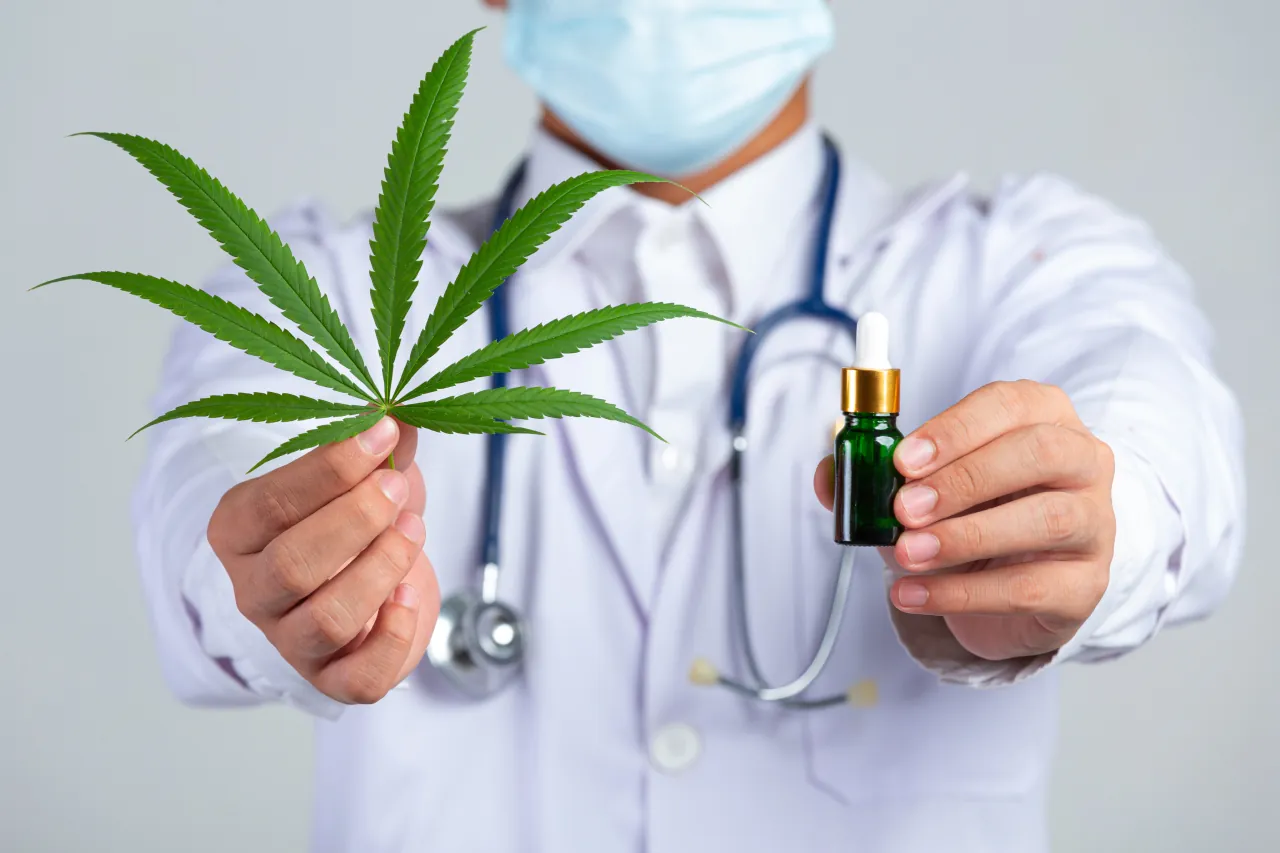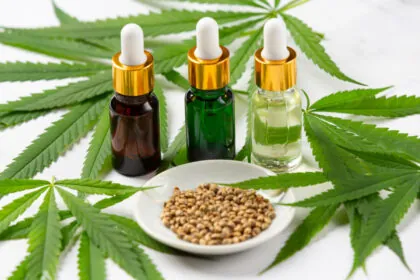Dive into the world of CBD as we unravel the question on many minds: Is CBD Addictive?
In recent years, cannabidiol, or CBD, has garnered significant attention for its potential health benefits.
Yet, amidst the buzz, concerns about addiction have lingered.
Let’s embark on a journey to understand the nature of CBD, its interaction with the body, and dispel myths surrounding its addictive potential.
Join us as we explore the science behind cannabidiol and shed light on whether it’s a remedy without repercussions or harbors any addictive traits.
CBD, or cannabidiol, is generally considered non-addictive.
Unlike its counterpart THC (tetrahydrocannabinol), which is another compound found in cannabis, CBD does not produce psychoactive effects that lead to addiction.
Can you Get Addicted to CBD?
Here’s a breakdown:
Non-Psychoactive Nature: Cannabidiol doesn’t create a “high” or euphoria that is commonly associated with addictive substances.
It interacts with different receptors in the brain than THC, mainly with the endocannabinoid system, which helps regulate various physiological processes.
Lack of Tolerance Buildup: Unlike some substances that can lead to increased tolerance over time, studies suggest that CBD doesn’t cause the same effect.
This means users don’t need to continually increase their dose to experience the same effects.
Withdrawal Symptoms: Addictive substances often lead to withdrawal symptoms when usage is stopped.
CBD withdrawal symptoms are generally not reported, further indicating its non-addictive nature.
However, it’s crucial to note that while CBD itself may not be addictive, some cannabidiol products might contain trace amounts of THC.
Full-spectrum cannabidiol products, for example, may have up to 0.3% THC, which is not enough to cause a high but could potentially show up on a drug test.
Always choose high-quality, THC-free CBD products to ensure the absence of any psychoactive compounds.
As with any substance, individual responses can vary, and it’s recommended to consult with a healthcare professional before incorporating CBD into your routine, especially if you have a history of substance abuse or are taking medications.
Is CBD Addictive?
Responsible use is crucial.
When used as directed and within recommended dosages, CBD is not considered addictive.
It’s essential to follow product guidelines, especially in terms of concentration and frequency.
Individuals should consult with healthcare professionals for personalized advice, particularly if they have a history of substance abuse or underlying health conditions.
Scientific investigations have consistently shown that cannabidiol lacks addictive properties.
The World Health Organization’s (WHO) 2017 Pre-Review Report affirms that “evidence from well-controlled human experimental research indicates that CBD is not associated with abuse potential.”
Additionally, a modest 2016 study demonstrated that, unlike active THC, which induced notable physical and psychological effects like an accelerated heart rate and euphoria, CBD had no impact on heart rate, blood pressure, or cognitive function.
In terms of self-reported feelings of intoxication, cannabidiol mimicked the response of a placebo, contrasting sharply with THC participants who reported experiencing euphoria and sedation.
Who Can Use CBD?
CBD, or cannabidiol, is widely considered safe for use by various individuals.
While it’s always advisable to consult with a healthcare professional, here’s a general overview of who can benefit from CBD:
Adults
Many adults use it for various purposes, such as managing stress, promoting relaxation, or addressing specific health concerns.
It’s essential to choose products with appropriate potency and to follow recommended dosages.
Seniors
Cannabidiol is increasingly popular among seniors for its potential in managing age-related issues, including joint discomfort and sleep difficulties.
As with any supplement, it’s crucial to consider individual health conditions and potential interactions with medications.
Athletes
Some athletes turn to CBD for its potential in managing exercise-induced inflammation and supporting recovery.
However, it’s vital to ensure compliance with anti-doping regulations if applicable.
Individuals with Anxiety or Stress
It is often sought after for its potential calming effects.
Many people use it as part of their wellness routine to manage symptoms of anxiety and stress.
Those with Sleep Issues
It may assist in promoting better sleep by addressing factors like anxiety and discomfort.
However, individual responses vary, and it’s advisable to establish a consistent routine and dosage for optimal results.
People with Chronic Conditions
Individuals dealing with chronic conditions such as arthritis, migraines, or neuropathic pain may explore cannabidiol as a complementary approach.
It’s crucial to coordinate with healthcare providers to ensure it aligns with the overall treatment plan.
Individuals Seeking Overall Wellness
Even those without specific health concerns may incorporate cannabidiol into their routine to support overall well-being.
Some use it as a daily supplement to potentially enhance their mood, focus, and balance.
It’s important to note that while CBD is generally well-tolerated, potential interactions with medications should be considered.
Pregnant and breastfeeding individuals should also exercise caution, and it’s advisable to consult with a healthcare professional before using cannabidiol in these cases.
As regulations and research evolve, it’s essential to stay informed about the latest developments in the use of cannabidiol.
CBD Mechanisms Through Your Body
BD’s mechanisms differ significantly from substances that lead to addiction, providing a foundation for understanding its physiological safety.
Here’s a breakdown of these distinctions:
Receptor Interaction
Cannabidiol: Interacts with the endocannabinoid system, primarily targeting CB1 and CB2 receptors indirectly.
Cannabidiol modulates rather than directly binds to these receptors, influencing neurotransmitter release.
Addictive Substances: Many addictive substances, like opioids or nicotine, directly bind to receptors, triggering a cascade of neurotransmitter releases that contribute to the addictive cycle.
Dopamine Levels
Cannabidiol: Does not lead to a significant increase in dopamine levels.
While it influences neurotransmitters, it doesn’t flood the brain with dopamine, the neurotransmitter associated with reward and pleasure.
Addictive Substances: Often induce a surge in dopamine, creating a reinforcing loop that strengthens the desire for repeated use, contributing to addiction.
Withdrawal Symptoms
Cannabidiol: Does not typically cause withdrawal symptoms when usage is stopped.
Users can cease CBD intake without experiencing cravings or negative physical reactions.
Addictive Substances: Withdrawal symptoms are common with addictive substances, ranging from physical discomfort to psychological distress, reinforcing the need for continued use.
Tolerance Buildup
Cannabidiol: Studies suggest that CBD does not lead to rapid tolerance buildup, meaning users can maintain the desired effects with consistent dosages over time.
Addictive Substances: Many substances require increasing doses to achieve the same effects due to the development of tolerance, potentially leading to escalated use and dependence.
Neurotransmitter Modulation
Cannabidiol: Modulates various neurotransmitters, including serotonin, anandamide, and GABA, contributing to its potential calming effects without causing a drastic alteration in cognitive function.
Addictive Substances: Often lead to imbalances in neurotransmitters, disrupting normal brain function and reinforcing addictive behaviors.
Impact on Brain Reward Circuit
CBD: Does not hijack the brain’s reward circuit, which is a common characteristic of addictive substances. It influences the endocannabinoid system without triggering excessive reward responses.
Addictive Substances: Exploit the brain’s reward circuit, creating a powerful association between substance use and pleasure, reinforcing addictive tendencies.
Understanding these physiological differences helps emphasize why CBD is considered non-addictive.
Its nuanced impact on neurotransmitters and receptors sets it apart from substances that contribute to addiction, providing a safer option for those seeking potential therapeutic benefits.
How to Use Cannabidiol?
Using CBD can be a personalized experience, and the appropriate method depends on individual preferences, the desired effects, and the specific CBD product.
Here’s a guide on different ways to use CBD:
CBD Oil/Tinctures
How to Use: Place a few drops of CBD oil under the tongue using a dropper. Hold the oil under the tongue for about 60-90 seconds before swallowing. This allows for sublingual absorption, enhancing bioavailability.
Benefits: Quick absorption, easy dosage control.
CBD Capsules/Pills
How to Use: Swallow CBD capsules or pills with water, similar to any other supplement or medication.
Benefits: Discreet, pre-measured doses, no taste of CBD.
CBD Edibles
How to Use: Consume CBD-infused edibles like gummies, chocolates, or beverages. The onset of effects may be slower due to digestion.
Benefits: Tasty, easy to incorporate into daily routine.
CBD Topicals
How to Use: Apply Cannabidiol creams, balms, or lotions directly to the skin on targeted areas. Massage gently for absorption.
Benefits: Targeted relief for localized issues, no systemic effects.
CBD Vape Products
How to Use: Inhale vaporized Cannabidiol using a vape pen or vaporizer. This method offers rapid absorption.
Benefits: Fast-acting, customizable dosages, discreet.
CBD Patches
How to Use: Apply a Cannabidiol patch to clean, dry skin. The patch releases Cannabidiol gradually over time.
Benefits: Long-lasting effects, continuous dosing.
CBD Inhalation (Flower or Concentrates)
How to Use: Smoke or vaporize Cannabidiol -rich hemp flower or concentrates.
Benefits: Fast onset of effects, customizable dosages.
CBD Beverages
How to Use: Consume Cannabidiol -infused beverages like water, tea, or coffee.
Benefits: Convenient, easy integration into daily routines.
Tips for Using CBD
Start with a Low Dose: Begin with a low Cannabidiol dosage and gradually increase if needed.
Individual responses vary.
Consult a Healthcare Professional: Especially if you are on medications or have underlying health conditions, consult with a healthcare provider before using CBD.
Consider Time of Day: Some people prefer using Cannabidiol in the morning for focus or in the evening for relaxation. Experiment to find what works best for you.
Quality Matters: Choose reputable Cannabidiol brands that provide third-party lab testing to ensure product quality and purity.
Remember, it’s essential to be patient and consistent, as Cannabidiol effects may vary over time.
It’s advisable to start with a lower dose and adjust as needed based on your response.
Conclusion
In conclusion, the question of whether you can get addicted to Cannabidiol finds a reassuring answer in the wealth of scientific evidence and user experiences.
The overwhelming consensus points towards Cannabidiol being a non-addictive substance, with reputable organizations like the World Health Organization affirming its lack of abuse potential.
As we’ve delved into the physiological aspects that set Cannabidiol apart from addictive substances, it becomes clear that its interaction with the body’s receptors, neurotransmitters, and lack of withdrawal symptoms contribute to its safety profile.
For those considering incorporating Cannabidiol into their wellness routine, this exploration emphasizes responsible use and dispels common myths surrounding addiction risks.
It encourages individuals to make informed decisions, highlighting the importance of choosing high-quality products, consulting with healthcare professionals, and starting with conservative dosages.
As the landscape of CBD research evolves, continued awareness and education are crucial.
CBD’s potential benefits, coupled with its non-addictive nature, offer a promising avenue for those seeking alternatives for various health and wellness goals.
In this journey of exploration, let’s celebrate the growing understanding of Cannabidiol and its place in promoting a balanced and informed approach to well-being.
As with any supplement or lifestyle choice, knowledge empowers, and with Cannabidiol , it’s a journey towards potential benefits without the specter of addiction.
FAQs
Is CBD addictive?
No, Cannabidiol is not addictive. Scientific research, including a 2017 report by the World Health Organization, indicates that Cannabidiol is not associated with abuse potential.
It lacks the psychoactive properties that contribute to addiction in substances like THC.
Can you develop a tolerance to CBD?
Studies suggest that Cannabidiol does not lead to rapid tolerance buildup.
Users can often maintain the desired effects with consistent dosages over time, making it distinct from substances that commonly lead to escalating tolerance.
Does CBD cause withdrawal symptoms?
No, It typically does not cause withdrawal symptoms when usage is stopped.
Unlike addictive substances, users can cease Cannabidiol intake without experiencing cravings or negative physical reactions.
Is there a risk of psychological dependence on CBD?
Cannabidiol does not induce the euphoric “high” associated with addictive substances.
Its non-psychoactive nature and lack of impact on the brain’s reward circuit contribute to a lower risk of psychological dependence.
Can you get addicted to other cannabis compounds found in full-spectrum Cannabidiol?
Full-spectrum Cannabidiol products may contain trace amounts of THC, but in legally permissible concentrations (usually below 0.3%).
The amount is not enough to cause addiction, and Cannabidiol itself counteracts some of THC’s psychoactive effects.
Is it possible to overdose on Cannabidiol ?
There is no known lethal dose of Cannabidiol .
It is generally well-tolerated, and extremely high doses may lead to side effects such as drowsiness or gastrointestinal issues.
However, responsible dosing is recommended to maximize benefits and minimize potential side effects.





